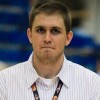 LAS VEGAS — When the Golden State Warriors won the 2015 NBA title, it became official — the slow it down and throw the ball inside style of play is a thing of the past, and pushing the ball and spacing the floor is the way of the future.
LAS VEGAS — When the Golden State Warriors won the 2015 NBA title, it became official — the slow it down and throw the ball inside style of play is a thing of the past, and pushing the ball and spacing the floor is the way of the future.
Here in the NBA’s de facto summer capital, Mike D’Antoni, Ettore Messina and Bob Donewald shared some of their secrets on how their international experience has helped them positively influence the NBA game.
With many from the vast global basketball community making their way to Las Vegas for the NBA Summer League, tournament founder and coaching super-agent Warren Legarie decided to put together an international coaching clinic, bringing together some of the best minds in the business to learn from some of the brightest international coaching minds.
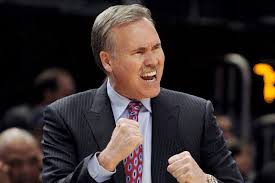 With several NBA coaches in attendance, including Portland’s Terry Stotts and Memphis’ Dave Joerger, as well as many of Europe’s top coaches, this was primed to be a top learning experience. Entering my 5th season as an assistant coach at the top level in Israel, this was a chance for me to learn from guys that have done it at the highest levels on both sides of the pond.
With several NBA coaches in attendance, including Portland’s Terry Stotts and Memphis’ Dave Joerger, as well as many of Europe’s top coaches, this was primed to be a top learning experience. Entering my 5th season as an assistant coach at the top level in Israel, this was a chance for me to learn from guys that have done it at the highest levels on both sides of the pond.
And what a learning experience it was.
Coach Bob Donewald Jr, currently with the D-League’s Iowa Energy, was the first speaker. Donewald famously was hired by Yao Ming’s club in the Chinese CBA before becoming the coach of the Chinese National Team. Donewald grew up as the son of a coach; his father, Bob Donewald Sr. was a longtime assistant of legendary coach Bobby Knight, and although the principles of American basketball are engraved in Donewald’s basketball DNA, he had managed to find success in a country whose culture is vastly different from the USA.
One of the most important lessons coach Donewald gave the group was not to try to come and change the entire culture of a club in one day, but rather to pick the most crucial details to improve upon. When being a foreign coach, you are, “Hired to be fired” and if you come in and try to change everything that players and teams have known for their entire careers, it is very unlikely you will gain their trust … or last very long.
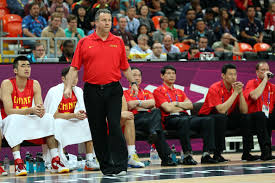 Donewald’s biggest issues in China concerned communication, as in Chinese culture it is considered disrespectful to outwardly verbally correct someone publicly, and the mandatory 3-4 hours practices twice a day, seven days a week.
Donewald’s biggest issues in China concerned communication, as in Chinese culture it is considered disrespectful to outwardly verbally correct someone publicly, and the mandatory 3-4 hours practices twice a day, seven days a week.
When Donewald arrived in China, he said players were so quiet on the court, he was lucky if he could get someone to say one word on defense.
“In China they have a saying, If there is a flock of birds and one sticks their head above the flock, they deserve to have their head shot off.”
Lastly, Donewald spoke of the importance of maintaining constant communication with your team’s management and ownership. Coach was saying how in the preseason in China, there is a lot of media pressure to win games, however he wanted to use the time to develop his younger players to be ready for the season.
With pressure from ownership to win, Coach Donewald needed to get management and ownership to buy in, or he would not last very long. “If your only talking to your owner once a month, your owner gets a haircut once a month, that means you’re in his ear less than his barber!”
Next up was Coach Ettore Messina, currently an assistant coach for the San Antonio Spurs, but an absolute legend in European basketball. Messina was named one of the 50 Greatest Euroleague Contributors of all time in a career that has taken him to major clubs such as CSKA Moscow, Real Madrid and Benetton Treviso, where he has won 4 Euroleague titles.
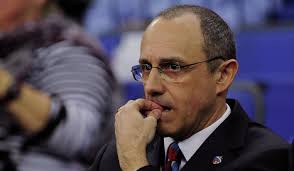 Messina opened by saying, “It would be suicide to talk about offense, since I am speaking before Mike D’Antoni, so let’s talk about defense.”
Messina opened by saying, “It would be suicide to talk about offense, since I am speaking before Mike D’Antoni, so let’s talk about defense.”
Immediately you could see why Messina is such a great fit working with Coach Popovich in San Antonio, as Messina harped on timing and spacing almost from the beginning.
Bringing some volunteers onto the floor, Messina demonstrated the proper way to take away the first pass to avoid being caught in a 2 on 1 situation, as well as how to properly deny your man so that they will get the ball in a less comfortable position.
Interestingly, Messina harped on the importance of getting players to buy in on the right time to be aggressive and the right time to take a step back. He spoke how in the amateur levels, you will see teams either using nonstop pressure, or settling in on defense as their system, when in reality the most ideal way to play defense is to have a proper mixture of both and to understand when to be aggressive.
Messina talked about some of the fundamental differences between coaching in Europe and in the NBA, saying, “In Europe, you don’t have Tim Duncan” as he was showing the proper way to prevent a player from holding position down low.
“In the NBA, you have players who make big mistakes defensively, but are able to quickly recover with their athleticism, and even end up blocking a shot,” he said as he was demonstrating pick-and-roll defense.
On a personal level, Messina talked about the vast differences between the large coaching staffs in the NBA compared to Europe. In the NBA, teams have a seemingly endless amount of assistant coaches, player development coaches, trainers, scouts, video coordinators, as well as many more basketball minds in the front office. Even on a top team in Europe, a coaching staff will consist of a Head Coach, two assistant coaches, a trainer, a physiotherapist, and if you’re lucky, a scout or two.
Messina spoke how earlier in his career, he would have one assistant coach, and spoke about the most ideal ways to view a practice and the most important details to cover in this situation.
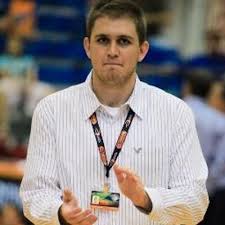 In my career, being with Maccabi Rishon Lezion for three seasons, and entering my second season with Bnei Herzliya, though my title has been assistant coach, I’ve had to be the scout, video coordinator, player development coach, assistant GM, a translator and even have had multiple stints as a driver for a player or coach.
In my career, being with Maccabi Rishon Lezion for three seasons, and entering my second season with Bnei Herzliya, though my title has been assistant coach, I’ve had to be the scout, video coordinator, player development coach, assistant GM, a translator and even have had multiple stints as a driver for a player or coach.
It made me really appreciate the experience I am getting, coaching in one of Europe’s top leagues against big budget teams like Maccabi Tel-Aviv and Hapoel Jerusalem, coaching former and hopefully future NBA players, but still getting to gain experience in a wide variety of aspects of professional basketball.
While on a day-to-day basis my focus is on having a good practice and working toward winning the next game or overcoming the newest challenge, hearing this from someone as revered as Messina allowed me to take a step back and appreciate how lucky I am to be getting this experience.
Last but certainly not least, “The Godfather of Analytics” as Legarie introduced him, D’Antoni went into detail about his famous “Seven Seconds or Less” system with the Phoenix Suns that changed the NBA forever.
Coming out of an era where the 3-point shot had only just recently started to be properly utilized, D’Antoni spoke about how lucky he was to have had immediate success with the Suns. He spoke about how much easier it was to get guys to stay in their spots, play out of position, and change the way they had played their entire lives when the team was winning and everyone was getting their numbers.
An example: We have reached an era in the NBA that is so different that a former No.1 overall pick in Andrew Bogut could be benched in the finals, and actually have it help his team.
D’Antoni showed how in practice, they would have X’s on the floor for all 5 spots, so that players needed to know exactly where to be every time in order to properly space the floor every single possession. A player in the corner could not step inside the 3 point line, as that would both lessen the spacing and make an angle pick and roll lose that few extra inches that is the difference between an easy basket and a turnover.
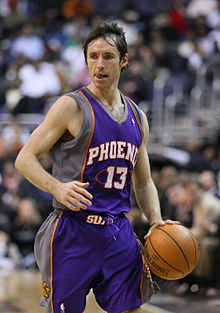 Having Nash as his point guard may have made his transition easier, but D’Antoni stressed that when you get to this level, you need to allow great players to be themselves and put them into position to play to their strengths. He spoke about how each point guard has his own rhythm, and you need to allow a player to play his game.
Having Nash as his point guard may have made his transition easier, but D’Antoni stressed that when you get to this level, you need to allow great players to be themselves and put them into position to play to their strengths. He spoke about how each point guard has his own rhythm, and you need to allow a player to play his game.
“People always said, you must have learned a ton playing with Tiny Archibald with the Kansas City Royals,” D’Antoni said. “If I tried to play like Nate, I would be out of the league before I knew it.”
Interestingly enough, D’Antoni said that contrary to the book “Seven Seconds Or Less” his offense is not about only running and jacking up threes every time down.
“In a 90 possession game, if you’re shooting 30 3-point shots, you are still taking mostly 2-point shots.” He spoke about how his target is to consistently have a high effective field goal percentage (an advanced stat covering 3PT, 2PT and FT), and running actions that have a high Points Per Possession rate.
D’Antoni said he felt that one of the main reasons that people were reluctant to accept his system was that commentators were former players who succeeded in a different era with a different brand of basketball.
“Commentators always say you live by the 3 or die by the 3. What does that even mean? Have you ever heard anyone say live by the post up, die by the post up?” He went on to use examples of how aside from a handful of players; post ups had significantly lower Points Per Possession than an open 3 from a good shooter.
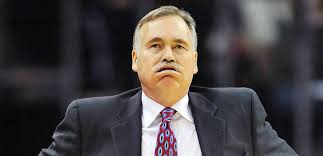 A great lesson D’Antoni harped on was to make sure that players are always working on what they will actually be doing in a game. “I see all these development guys, having players throw the ball off the backboard and take crazy shots and think, if that guy did that once in a game I would take him out right away.” He stressed that instead of doing complicated drills on moves that may not be relevant for a player, guys should work more on catch and shoot situations, and actual basketball actions that the player will use on the floor for his team.
A great lesson D’Antoni harped on was to make sure that players are always working on what they will actually be doing in a game. “I see all these development guys, having players throw the ball off the backboard and take crazy shots and think, if that guy did that once in a game I would take him out right away.” He stressed that instead of doing complicated drills on moves that may not be relevant for a player, guys should work more on catch and shoot situations, and actual basketball actions that the player will use on the floor for his team.
To finish, D’Antoni said that while play-calling can be important, letting players be themselves and focusing on actions instead of play calls can actually be the best tactic. He mentioned that his favorite scouting report he had ever seen was during his time with the Suns when an opposing assistant coach had left a report which read, “I don’t know what they are doing, and I don’t think they know either.”
When you have a point guard like Steve Nash, whose instincts and ability to make high-IQ basketball decisions on the fly are top notch, a play call can only serve as a tell for what you are doing.
Overall, getting to not only learn tactics, but understanding the mindsets of some of the top basketball minds in the world was an amazing experience.
Getting an opportunity to attain this knowledge from such successful coaches at this young stage in my career was invaluable, and I undoubtedly will take many of these lessons with me as the years go by.
AJ Mitnick is an American living in Israel and working as an assistant coach in the Israeli Basketball Winner League. Mitnick is the assistant coach of Bnei Herzliya, following three seasons with Maccabi Rishon-Lezion. Follow him on Twitter.